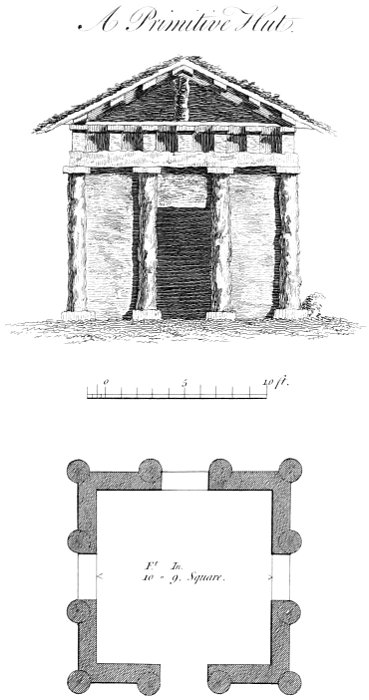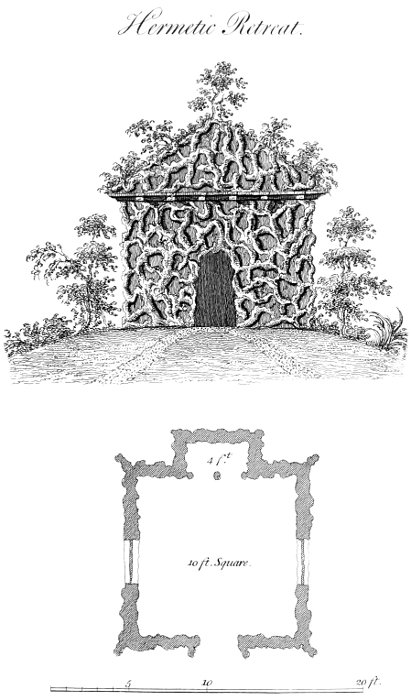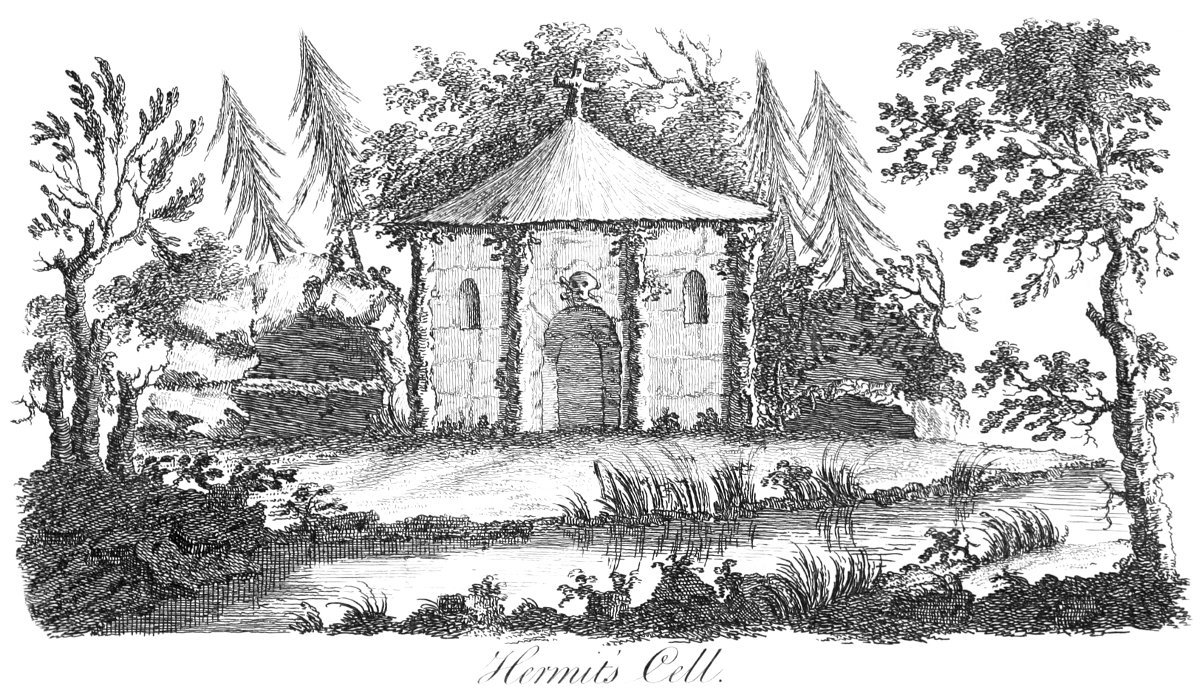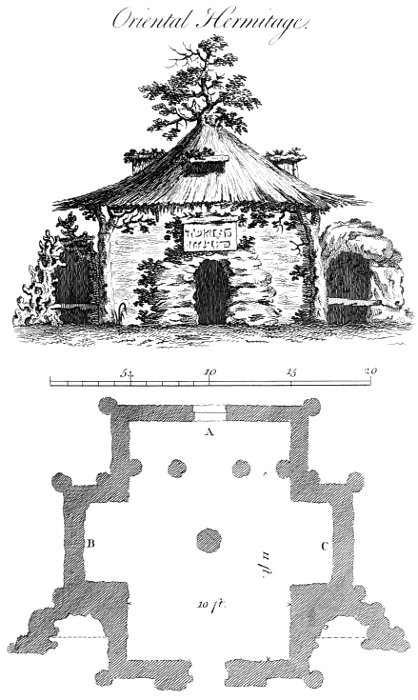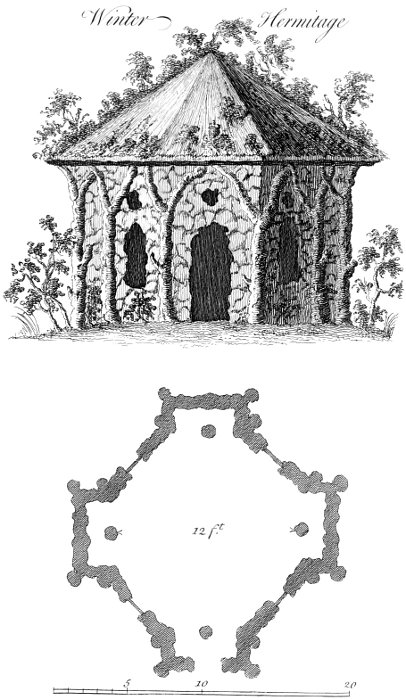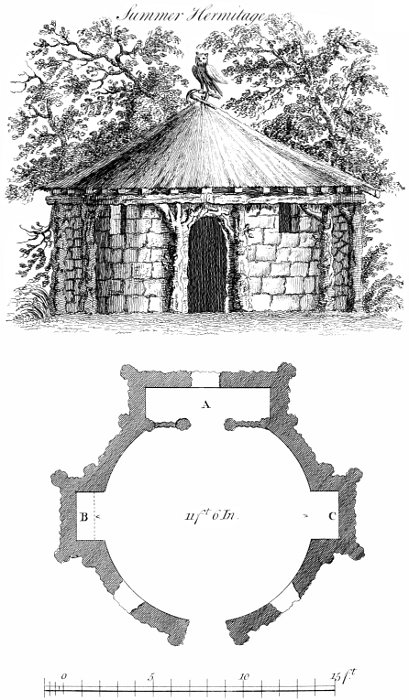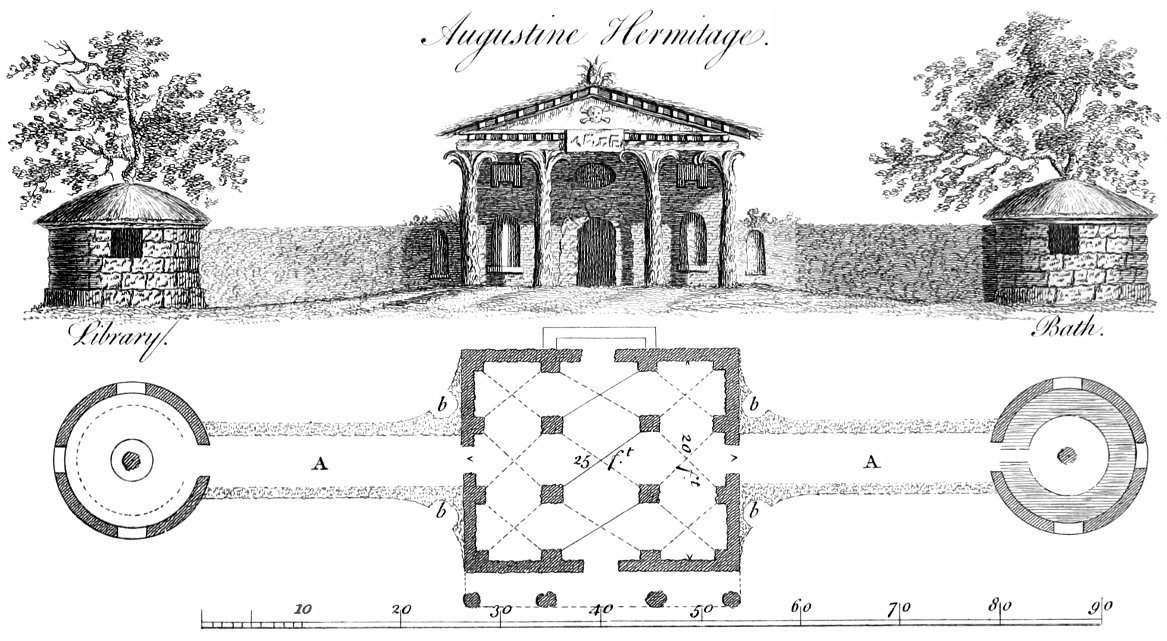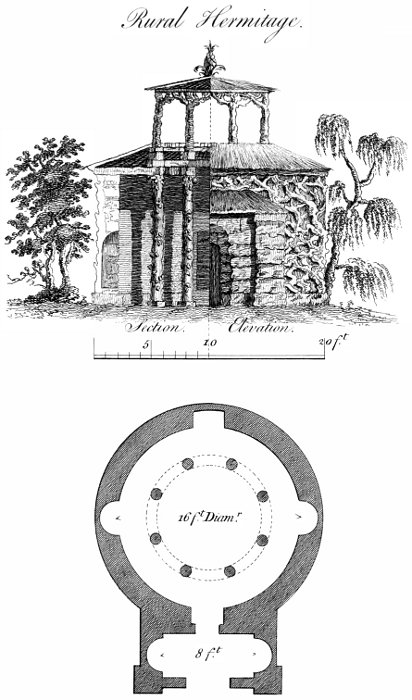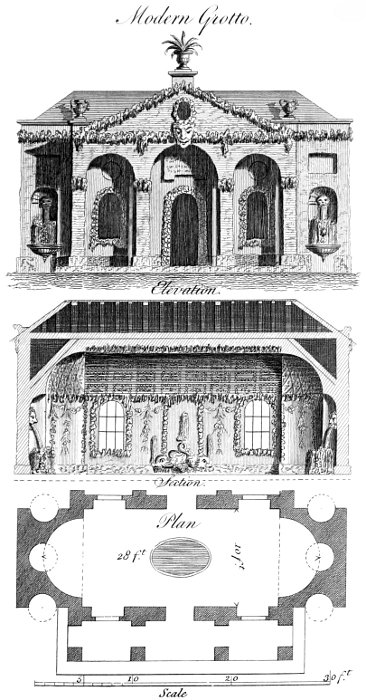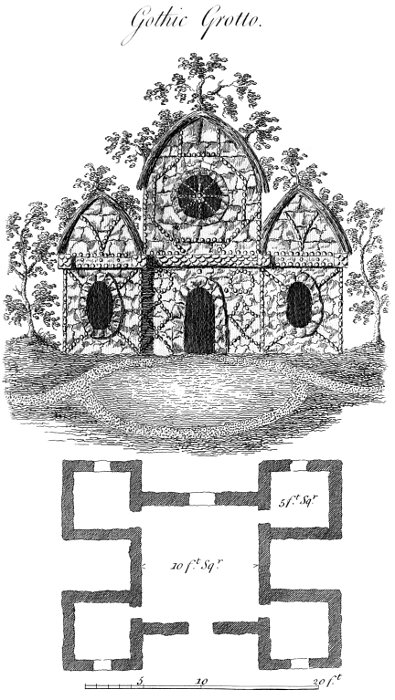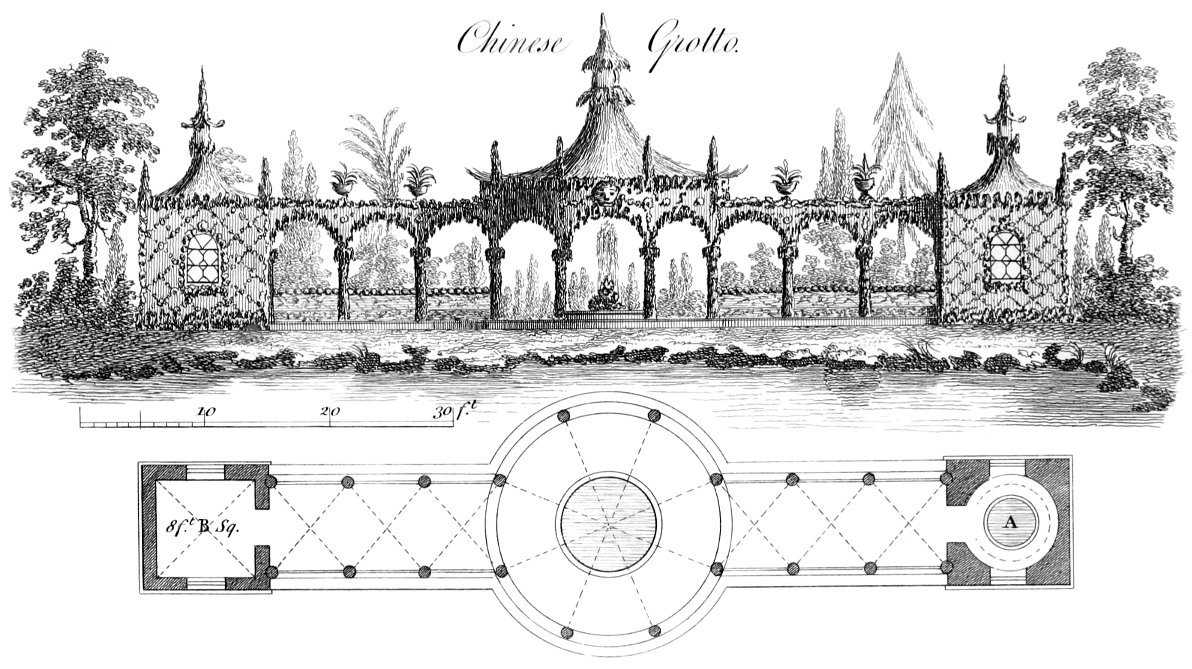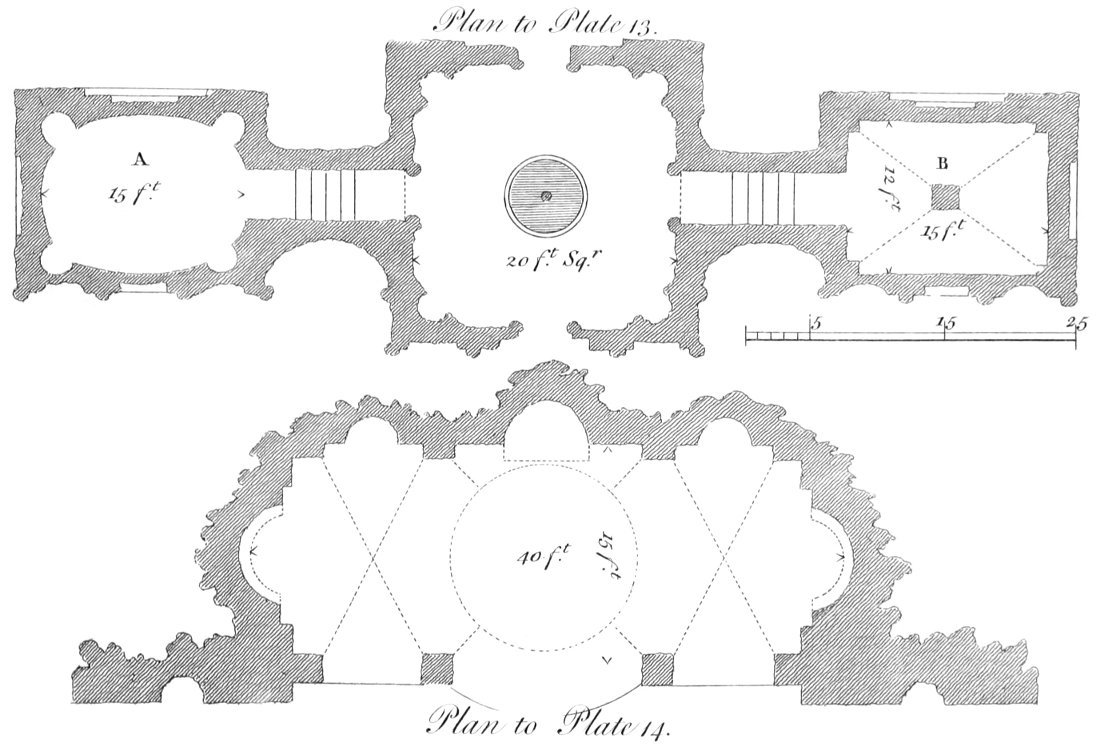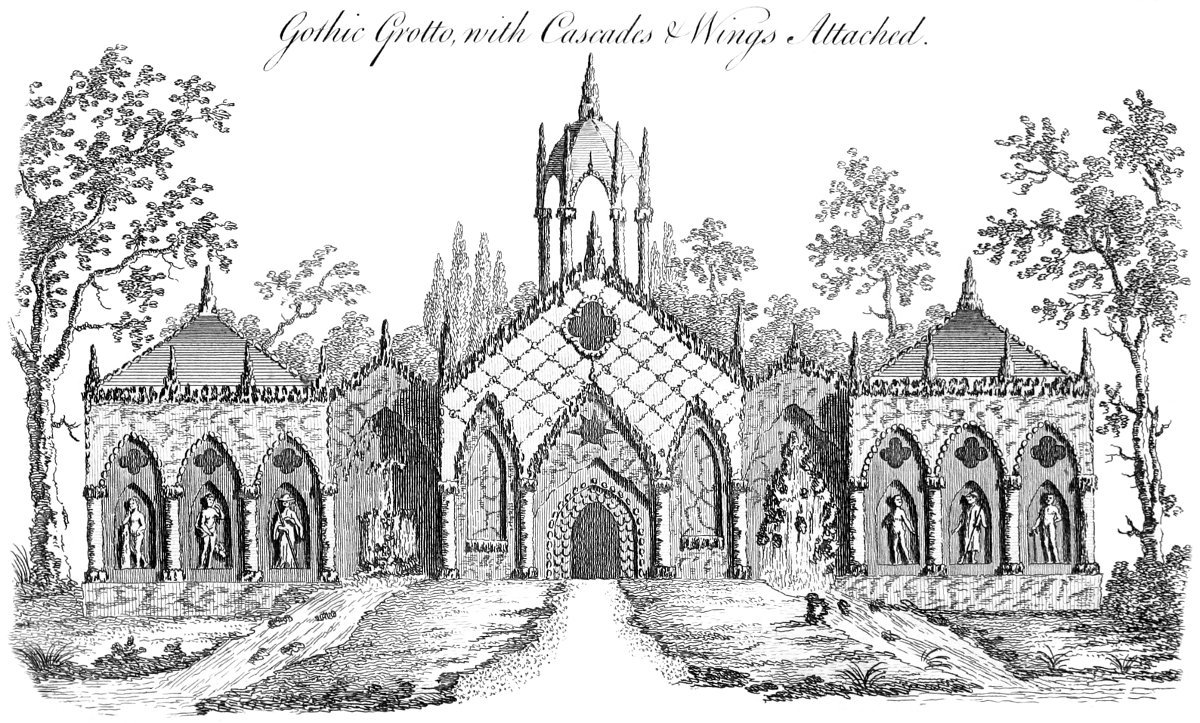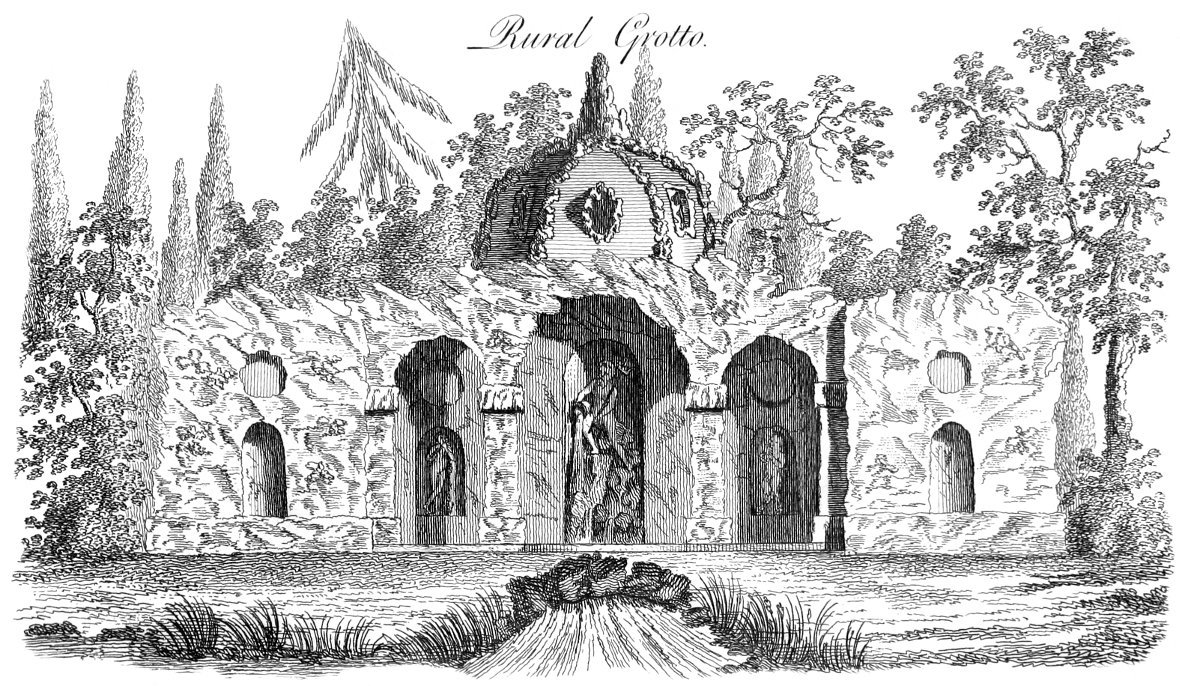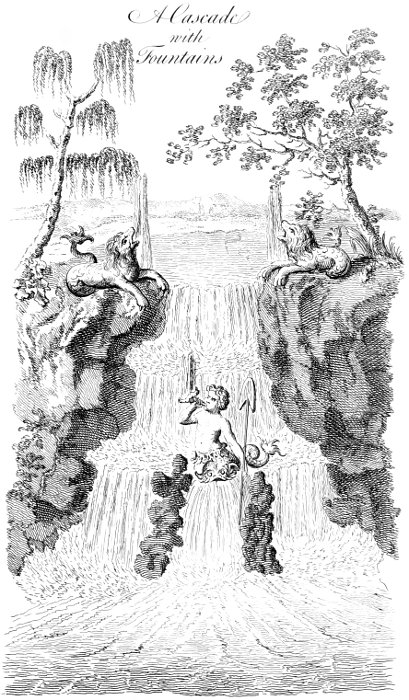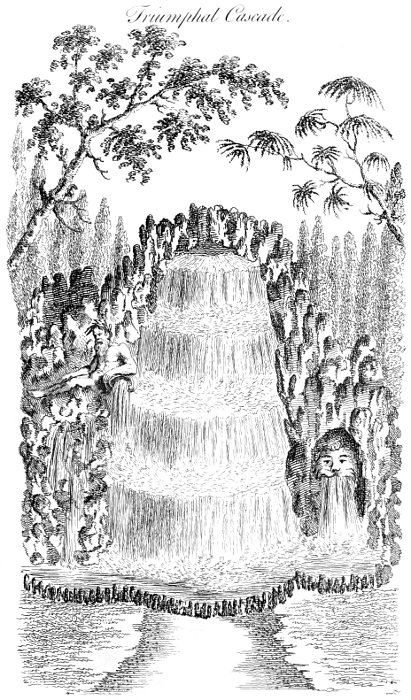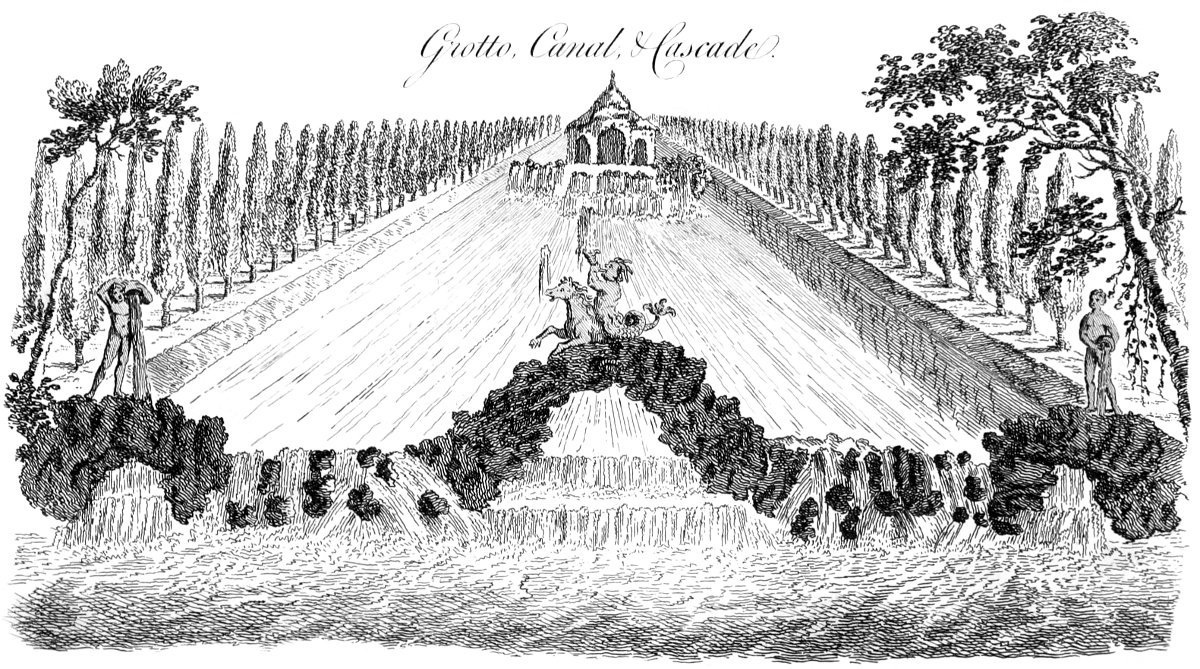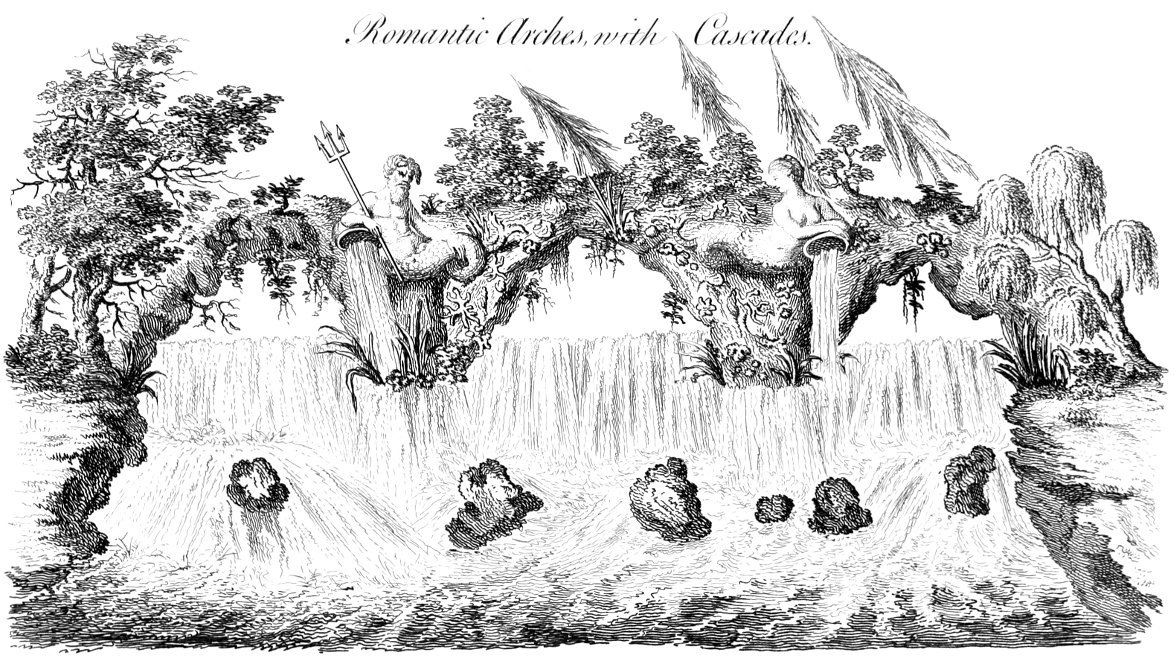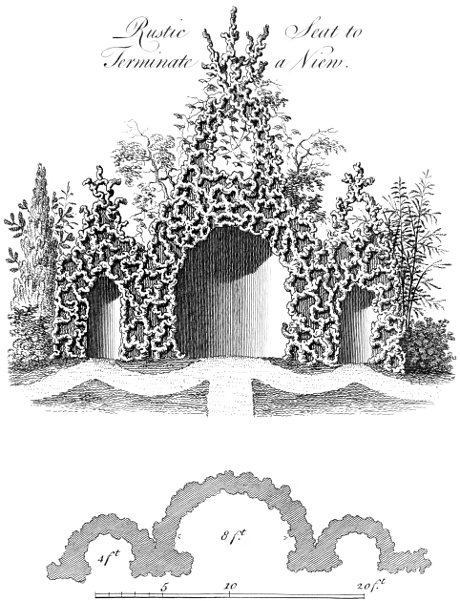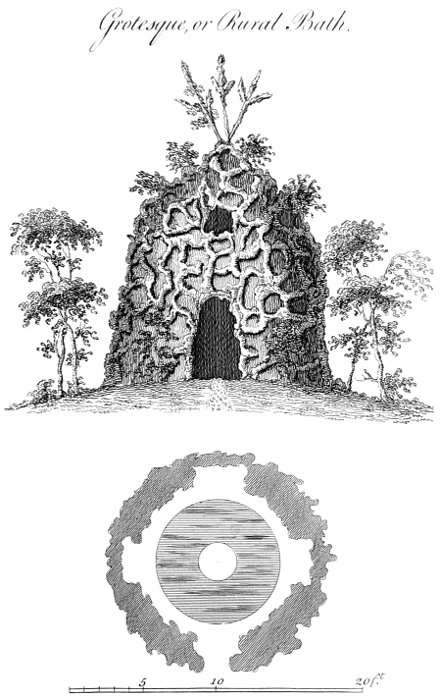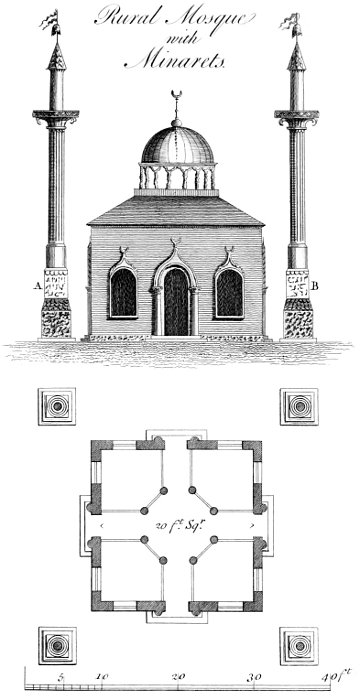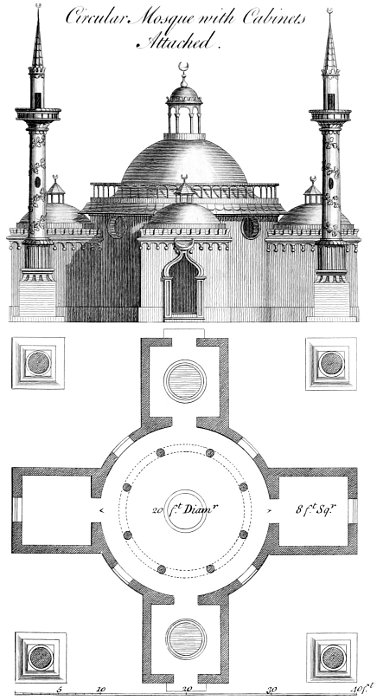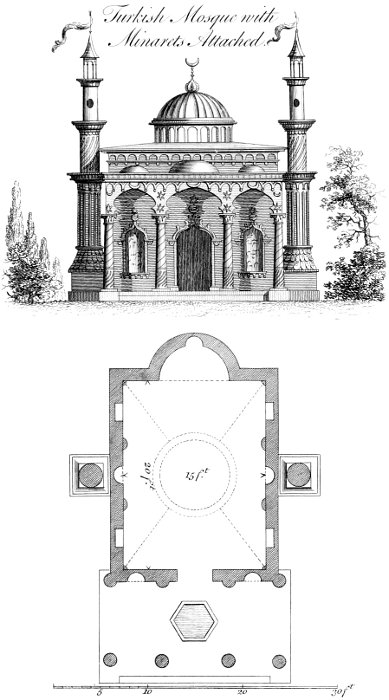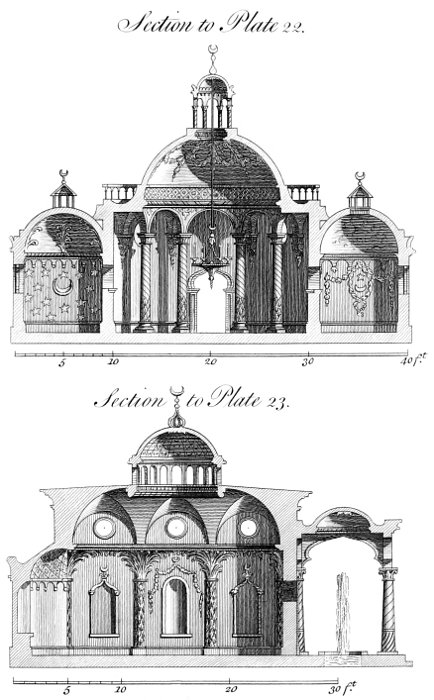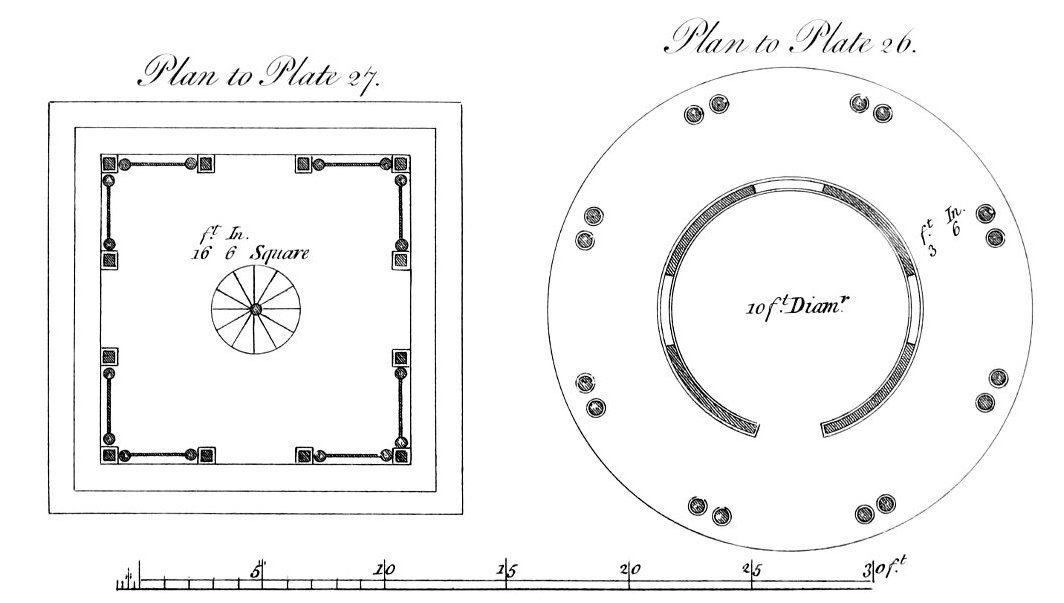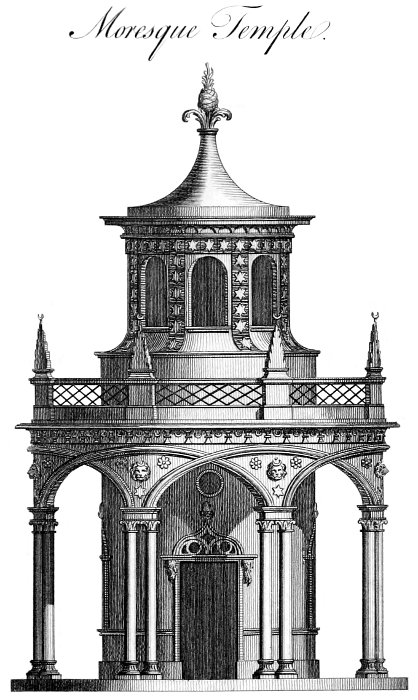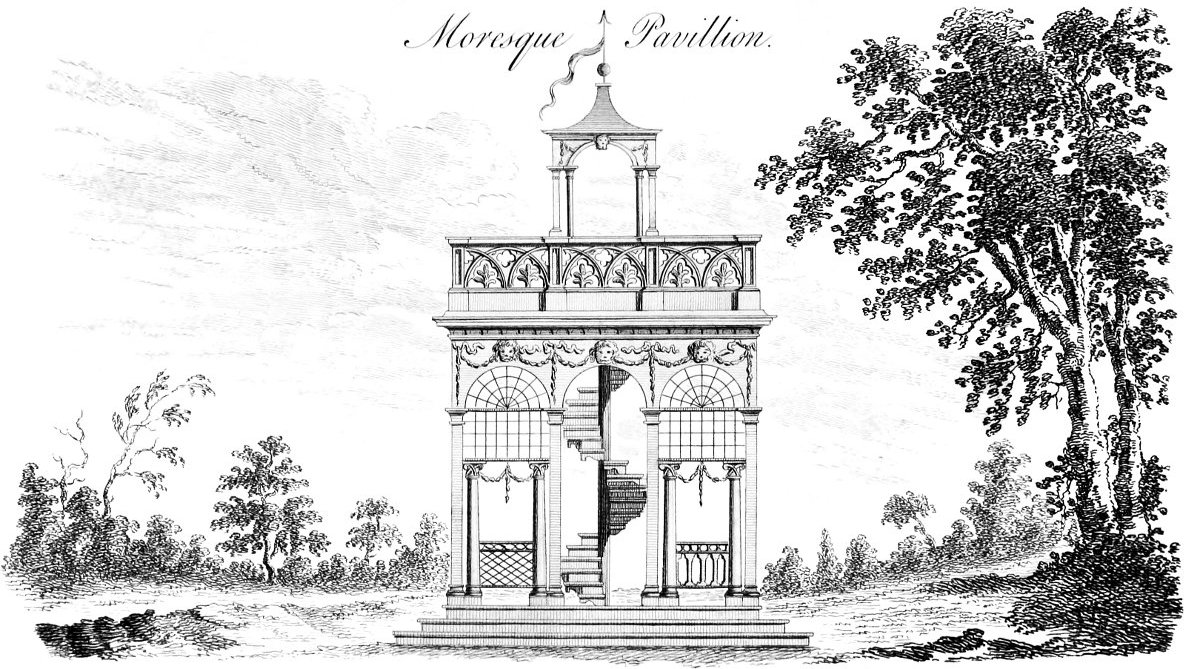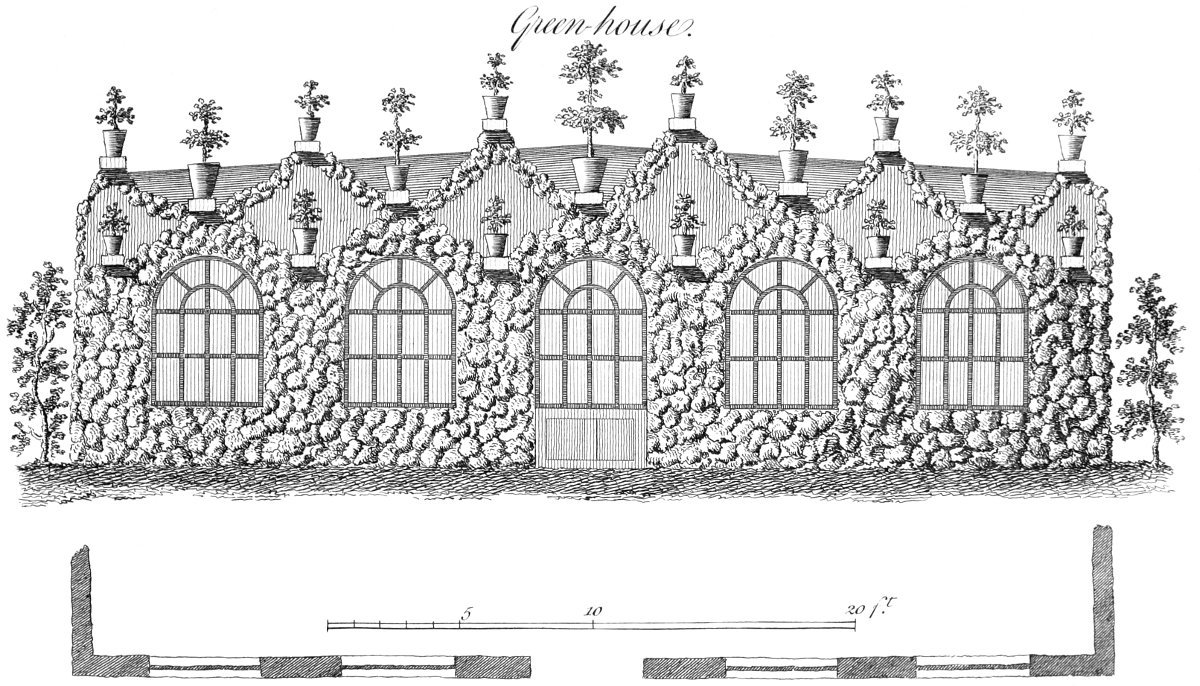The Project Gutenberg eBook of Grotesque architecture, by William Wrighte
This eBook is for the use of anyone anywhere in the United States and
most other parts of the world at no cost and with almost no restrictions
whatsoever. You may copy it, give it away or re-use it under the terms
of the Project Gutenberg License included with this eBook or online
at
www.gutenberg.org. If you
are not located in the United States, you will have to check the laws of the
country where you are located before using this eBook.
Title: Grotesque architecture
or, rural amusement
Author: William Wrighte
Release Date: November 24, 2022 [eBook #69417]
Language: English
Produced by: Chris Curnow, David Wilson and the Online Distributed Proofreading Team at https://www.pgdp.net (This file was produced from images generously made available by The Internet Archive)
*** START OF THE PROJECT GUTENBERG EBOOK GROTESQUE ARCHITECTURE ***

A. Thornthwaite invt.
Isaac Taylor ſculp.
Where Severn, Trent, or Thames’s Ouzy side
Pours the smooth Current of their easy Tide,
Each will require a sameneſs to the Spot,
For this a Cell, a Cascade or a Grot;
The Moſs, or gliding Streams productive Store,
To grace the Building on the Verdant Shore,
There the rough Tuscan, or the Rustic fix,
Or Pebbles, Shells, or calcin’d Matter mix,
The frozen Isicles resembled form,
Or Sea-green Weed your Grotto must adorn.
Art of Architecture, a Poem.
[title page]
GROTESQUE ARCHITECTURE;
OR,
RURAL AMUSEMENT:
CONSISTING OF
PLANS, ELEVATIONS, AND SECTIONS,
FOR
HUTS, RETREATS, SUMMER AND WINTER HERMITAGES,
TERMINARIES,
CHINESE, GOTHIC, AND NATURAL GROTTOS,
CASCADES, BATHS, MOSQUES, MORESQUE PAVILIONS,
GROTESQUE AND RUSTIC SEATS, GREEN-HOUSES, &c.
Many of which may be executed with
Flints, Irregular Stones, Rude Branches, and
Roots of Trees.
THE WHOLE CONTAINING
TWENTY-EIGHT NEW DESIGNS,
WITH SCALES TO EACH.
TO WHICH IS ADDED,
AN EXPLANATION,
WITH THE METHOD OF EXECUTING THEM.
By WILLIAM WRIGHTE, Architect.
A NEW EDITION.
LONDON:
Printed by W. Stratford, Crown-Court, Temple-Bar; for
J. TAYLOR,
AT THE ARCHITECTURAL LIBRARY, NO. 59, HIGH HOLBORN.
1815.
[p3]
GROTESQUE ARCHITECTURE.
Plan and elevation of a hut, to be built with trunks of
trees and irregular timber. The inside walls may be
lined with moss, and covered on the top with thatch. It is
intended to represent the primitive state of the Doric Order,
and is proper to be placed at the entrance of a wood, or on
the top of a small eminence. The dimensions are figured
on the plan.
Plan and elevation of an hermetic retreat, to be composed
of roots and irregular branches of trees, cemented together
with a strong binding clay, and may be thatched or covered
with branches of trees twined round with ivy. The dimensions
are figured on the plan.
Elevation of an hermit’s cell, with rustic seats attached,
eight feet square in the inside, which should be situated in
a rising wood near some running water, to be built partly of
large stones and trunks of trees, set round with ivy, and
lined with rushes, &c. The roof should be covered with
thatch, and the floor paved with small pebble stones or
cockle shells. The seats attached are intended to be composed
of large irregular stones, roots of trees, &c.
Plan and elevation for an hermitage, in the eastern style,
supposed to be built round a tree which supports its roof;
over the door is a tablet, with an Arabic inscription; the
roof is covered with thatch, in the Chinese taste; the inside
to be lined with billet wood and moss. It is lighted from
the lanterns above. A. should be a couch; B. C. are seats
of retirement. The dimensions are figured in the plan. The
rustic seats on the side are intended to be composed of large
rough stones and roots of pollard trees cemented together.
Plan and elevation of a winter hermitage, intended as a
retirement from hunting, fowling, or any other winter amusement;
the walls to be built of flints or rough stones, and
lined with wood or other warm substance intermixed with
moss, and should be situated on a rising ground planted
with evergreens.
Plan and elevation of a summer hermitage, designed to be
in a wilderness or thick wood; the walls to be composed of
large stones, and the ends faced with flints; the roof covered
with thatch, and an owl carved on the top; the floor should
be paved with sheeps marrow-bones placed upright, or any
other pretty devices intermixed with them. A. is for a couch;
B. C. are seats of retirement.
Plan and elevation of an hermitage in the Augustine style;
the front is ornamented with a portico of palm trees; in the
pediment is a scull, and a tablet with an inscription. A. A.
are passages of evergreens leading to the two circular retreats,
one of which is intended as a library, and the other
a bath; the tops of them are intended to be thatched;
b b b. are niches for seats cut in the evergreens. This design
is calculated to be built on a small verdant amphitheatre,
near a murmuring stream, and as a proper retreat from
the fatigues of a sultry day.
A plan, half an elevation, and half a section, of a rural
circular hermitage, designed for an open situation near some
rivulet, planted with weeping willows, &c. The inside is
lighted by a gazebo, supported by eight trunks of trees
twined about with ivy. The dimensions are figured on the
plan.
Plan, elevation, and section, of a grotto in a modern
architectonic style, ornamented with jet d’eaux, sea weeds,
looking-glass, fountains, and other grotesque decorations.
The dimensions may be known by the scale and the figures
on the plan.
Plan and elevation of a Gothic grotto, with four closets
five feet square; the outside to be composed of flints and
irregular stones, and studded with small pebbles; the inside
to be ornamented with shells, ores, &c. and if built upon an
eminence, it would have a very pleasing appearance.
Plan and elevation of an open Chinese grotto, to be placed
at the head of a grand canal, with a bath (A), and a Chinese
temple (B), attached; the arcades to be ice or frosted work;
the outside of the bath and temple to be ornamented with
beautiful shells in the Mosaic taste; the inside to be groined
over, as on the plan, and ornamented with shell-work and
other beautiful incrustations. The whole extent is 75 feet.
Plan and measures to plate xiii. and xiv.
Elevation of a Gothic grotto, with cascades and wings
attached (see the plan, plate xii.) The entrance is a saloon
of 20 feet square; the angles are couped with off niches,
where grotesque statues or vases should be placed. It is
intended to have a fountain in the centre, with antique figures
spouting out water; the walls should be lined with flints,
decorated with ice-work; the whole is lighted from a gazebo
on the top. A. B. are the plans of the two wings or repositories,
which are each descended to by a flight of four steps.
A. is intended to be ornamented with curious shells, gems,
coral, &c. with statues in the niches. B. is to be groined
over in the Gothic manner, with a pier in the centre to be
lined with flints, intermixed with shells, looking-glass, &c.
The groins should be incrusted with frosted work, in the
manner of dropping icicles. Both these wings are lighted
from the rose arches, as appears in the elevation; the outside
to be composed of rough stones incrusted and studded with
pebbles, shells, &c. There are placed in the recesses Gothic
figures. The situation should be in some retired copse,
shaded by an adjacent hill, near some murmuring rivulet,
where the cascades, or rather fountains, as in the design,
may be easily effected. The measures are marked on the
plan.
Elevation of a rural grotto (see the plan, plate xii.) which
should be built of large rough stones rudely put together, so
that the building may as near as possible imitate the beautiful
appearance of nature. If the dome was to be richly ornamented
with pendentive shell and frosted work, it would
look very elegant. In the middle niche is Neptune on a
rock, pouring out water, which descends under the pavement
through an arch, and forms a running stream. The side
niches are ornamented with satyrs and other grotesque figures.
The situation should be in a morass, near some water.
A design for a cascade or cataract of a great fall of
water, decorated with rock-work, sea lions pouring out
fountains of water; and a triton by way of embellishment,
in the centre.
A design for a triumphal cascade of four falls of water. If
care is taken to erect this arch with rude and irregular flints,
&c. at the same time paying a due observance to nature, it
will have a very magnificent appearance, and look extremely
elegant; and would be a superb ornament in a
nobleman’s park where there is a great supply of water.
A grotto, canal, and cascade, decorated with rock-work,
tritons, sybils, &c. pouring forth fountains of water. The
author hopes he may be indulged with observing, that he
hath with great pleasure seen a fine piece of water in the
park of the Earl of Essex, at Cashiobury, near Watford,
Herts, and flatters himself, that if the arch in this design,
on which the triton is placed, was to be executed there in
the nature of a bridge, it would have a very magnificent
and pleasing appearance.
A romantic bridge, or a cascade of three sheets of water,
descending through arches of artificial rock-work, incrusted
with shells, corals, sea-weed, moss, &c. and two sea gods
lying on their oozy couch, pouring out water.
Plan and elevation of a rustic seat for a garden or park,
intended to terminate a view. It would look very pretty if
it was built with flints, or irregular rude branches and roots
of trees.
Plan and elevation for a grotesque or rural bath, very
proper to be built in gardens, &c. for the benefit of bathing.
It is intended to have three seats within, by way of closets,
for the convenience of dressing and undressing. If the water
in the plan be left out, it will look very pleasing as a rural
hut.
Plan and elevation of a rural mosque with minarets. It
is divided into an octagon saloon, supported by eight columns,
lighted from the dome. The other apartments are four regular
small rooms or closets, which will serve for various
[p7] purposes. The minarets are placed in the plan by way of
ornament, to shew the true taste of the Turkish buildings;
and the singularity of the style of architecture is such, that
will render it a very pleasing ornament, if executed in a
pleasure ground, or upon an elevated verdant amphitheatre.
It may be built of wood, and stuccoed; the inside should be
painted with various rich colours, which would have a pleasing
and elegant appearance. The dome is supported by
irregular branches of trees, well connected and cramped together.
The minarets should be solid, and the pedestals
(A. B.) should be decorated with Arabic inscriptions. For
a more intelligible and historical account of these buildings,
I must refer the reader to Dr. Shaw’s Account of Barbary,
Le Brun and Tournefort’s Voyage to the Levant, &c.
Plan and elevation of a circular mosque twenty feet diameter,
with four cabinets attached, eight feet square; two
of which may serve for entrances, having each a small fountain,
five feet diameter; the other two may be for the purposes
of study or use. The four minarets at the angles bring
the plan upon the square of forty feet. The cabinets, as well
as the mosque, are crowned with domes, which should be
gilt on the outside. The great dome is supported by eight
columns, over which are groined arches; an iron balustrade
runs round the outside, which may be painted blue, and
gilt; on the top of the great dome is a light cupola, supported
by eight small columns, from whence hangs a chandelier
to light the inside when required. The other decorations
may be seen in the section, plate xxiv.
Plan and elevation for another mosque, with two minarets
attached to the body of the building, which may be executed
in brick of 14 inches thickness. The front is a portico of
four columns, in the oriental style, in the centre of which
is a fountain for sabateons; which may be seen in the section,
plate xxiv. The niches in the front should have Arabic
inscriptions in gold letters. The portico is covered with
three little domes, in the Turkish manner, ornamented with
crescents, &c. The inside is lighted from the circular windows
and little arches above, which support the dome. For
the interior decoration, see the section, plate xxiv. It
would look very beautiful if built on an open lawn, planted
round with a few cypress or other exotic trees. The dimensions
are figured on the plan.
Sections and scales to plates xxii. and xxiii.
Two plans of moresque temples to plates xxvi. and xxvii.
with their proper measures.
Elevation of a beautiful moresque temple (see the plan,
plate xxv.) The coupled columns support an arcade of intersecting
semi-ellipses, which goes quite round the temple.
In the spandrells are Moors heads, with crescents, roses,
and stars, over which is a parapet balustrade of net or lattice-work.
The body of the temple is 20 feet diameter,
crowned with an open lantern, from whence it is lighted;
the outside of which is adorned with stars of glass of an
azure ground. On the top is a pine, which should be double
gilt; and if the outside was covered with a glossy substance,
it would have a very pleasing and magnificent appearance.
The style of architecture is a medium between the Chinese
and Gothic, having neither the levity of the former nor the
gravity of the latter. The particularities of both this and
the following design are taken from those famous remains of
barbarian antiquity, the palace of Alhambra, at Granada,
the ancient moresque mosque at Cordova, the old cassavee
or palace of the Moorish kings at Mæquanez; for the accounts
of which the reader is referred to Willughbuy’s Travels
into Spain, Ockley’s Account of South or West Barbary,
and Shaw’s Travels to the Levant.
Elevation of a moresque pavilion (see the plan, plate xxv.)
in the style of the ancient Moors, raised on three steps.
Over the arches are Moors heads and festoons. In the middle
is a circular or geometrical staircase, leading to the top, or
balustrade. It is crowned with a square cupola, mounted
with a moresque standard; and is very proper to be built on
an eminence to command an extensive view.
Plan and elevation for a green-house of the grotesque
kind, faced with flints and irregular stones. The dimensions
may be found by the scale.
W. Stratford, Printer, Crown-Court, Temple-Bar.
Transcriber’s Note
Inconsistent spelling (icicles/isicles, pavilion/pavillion) and
hyphenation (sea-weed/sea weed) retained.
*** END OF THE PROJECT GUTENBERG EBOOK GROTESQUE ARCHITECTURE ***
Updated editions will replace the previous one—the old editions will
be renamed.
Creating the works from print editions not protected by U.S. copyright
law means that no one owns a United States copyright in these works,
so the Foundation (and you!) can copy and distribute it in the United
States without permission and without paying copyright
royalties. Special rules, set forth in the General Terms of Use part
of this license, apply to copying and distributing Project
Gutenberg™ electronic works to protect the PROJECT GUTENBERG™
concept and trademark. Project Gutenberg is a registered trademark,
and may not be used if you charge for an eBook, except by following
the terms of the trademark license, including paying royalties for use
of the Project Gutenberg trademark. If you do not charge anything for
copies of this eBook, complying with the trademark license is very
easy. You may use this eBook for nearly any purpose such as creation
of derivative works, reports, performances and research. Project
Gutenberg eBooks may be modified and printed and given away—you may
do practically ANYTHING in the United States with eBooks not protected
by U.S. copyright law. Redistribution is subject to the trademark
license, especially commercial redistribution.
START: FULL LICENSE
THE FULL PROJECT GUTENBERG LICENSE
PLEASE READ THIS BEFORE YOU DISTRIBUTE OR USE THIS WORK
To protect the Project Gutenberg™ mission of promoting the free
distribution of electronic works, by using or distributing this work
(or any other work associated in any way with the phrase “Project
Gutenberg”), you agree to comply with all the terms of the Full
Project Gutenberg™ License available with this file or online at
www.gutenberg.org/license.
Section 1. General Terms of Use and Redistributing Project Gutenberg™ electronic works
1.A. By reading or using any part of this Project Gutenberg™
electronic work, you indicate that you have read, understand, agree to
and accept all the terms of this license and intellectual property
(trademark/copyright) agreement. If you do not agree to abide by all
the terms of this agreement, you must cease using and return or
destroy all copies of Project Gutenberg™ electronic works in your
possession. If you paid a fee for obtaining a copy of or access to a
Project Gutenberg™ electronic work and you do not agree to be bound
by the terms of this agreement, you may obtain a refund from the person
or entity to whom you paid the fee as set forth in paragraph 1.E.8.
1.B. “Project Gutenberg” is a registered trademark. It may only be
used on or associated in any way with an electronic work by people who
agree to be bound by the terms of this agreement. There are a few
things that you can do with most Project Gutenberg™ electronic works
even without complying with the full terms of this agreement. See
paragraph 1.C below. There are a lot of things you can do with Project
Gutenberg™ electronic works if you follow the terms of this
agreement and help preserve free future access to Project Gutenberg™
electronic works. See paragraph 1.E below.
1.C. The Project Gutenberg Literary Archive Foundation (“the
Foundation” or PGLAF), owns a compilation copyright in the collection
of Project Gutenberg™ electronic works. Nearly all the individual
works in the collection are in the public domain in the United
States. If an individual work is unprotected by copyright law in the
United States and you are located in the United States, we do not
claim a right to prevent you from copying, distributing, performing,
displaying or creating derivative works based on the work as long as
all references to Project Gutenberg are removed. Of course, we hope
that you will support the Project Gutenberg™ mission of promoting
free access to electronic works by freely sharing Project Gutenberg™
works in compliance with the terms of this agreement for keeping the
Project Gutenberg™ name associated with the work. You can easily
comply with the terms of this agreement by keeping this work in the
same format with its attached full Project Gutenberg™ License when
you share it without charge with others.
1.D. The copyright laws of the place where you are located also govern
what you can do with this work. Copyright laws in most countries are
in a constant state of change. If you are outside the United States,
check the laws of your country in addition to the terms of this
agreement before downloading, copying, displaying, performing,
distributing or creating derivative works based on this work or any
other Project Gutenberg™ work. The Foundation makes no
representations concerning the copyright status of any work in any
country other than the United States.
1.E. Unless you have removed all references to Project Gutenberg:
1.E.1. The following sentence, with active links to, or other
immediate access to, the full Project Gutenberg™ License must appear
prominently whenever any copy of a Project Gutenberg™ work (any work
on which the phrase “Project Gutenberg” appears, or with which the
phrase “Project Gutenberg” is associated) is accessed, displayed,
performed, viewed, copied or distributed:
This eBook is for the use of anyone anywhere in the United States and most
other parts of the world at no cost and with almost no restrictions
whatsoever. You may copy it, give it away or re-use it under the terms
of the Project Gutenberg License included with this eBook or online
at
www.gutenberg.org. If you
are not located in the United States, you will have to check the laws
of the country where you are located before using this eBook.
1.E.2. If an individual Project Gutenberg™ electronic work is
derived from texts not protected by U.S. copyright law (does not
contain a notice indicating that it is posted with permission of the
copyright holder), the work can be copied and distributed to anyone in
the United States without paying any fees or charges. If you are
redistributing or providing access to a work with the phrase “Project
Gutenberg” associated with or appearing on the work, you must comply
either with the requirements of paragraphs 1.E.1 through 1.E.7 or
obtain permission for the use of the work and the Project Gutenberg™
trademark as set forth in paragraphs 1.E.8 or 1.E.9.
1.E.3. If an individual Project Gutenberg™ electronic work is posted
with the permission of the copyright holder, your use and distribution
must comply with both paragraphs 1.E.1 through 1.E.7 and any
additional terms imposed by the copyright holder. Additional terms
will be linked to the Project Gutenberg™ License for all works
posted with the permission of the copyright holder found at the
beginning of this work.
1.E.4. Do not unlink or detach or remove the full Project Gutenberg™
License terms from this work, or any files containing a part of this
work or any other work associated with Project Gutenberg™.
1.E.5. Do not copy, display, perform, distribute or redistribute this
electronic work, or any part of this electronic work, without
prominently displaying the sentence set forth in paragraph 1.E.1 with
active links or immediate access to the full terms of the Project
Gutenberg™ License.
1.E.6. You may convert to and distribute this work in any binary,
compressed, marked up, nonproprietary or proprietary form, including
any word processing or hypertext form. However, if you provide access
to or distribute copies of a Project Gutenberg™ work in a format
other than “Plain Vanilla ASCII” or other format used in the official
version posted on the official Project Gutenberg™ website
(www.gutenberg.org), you must, at no additional cost, fee or expense
to the user, provide a copy, a means of exporting a copy, or a means
of obtaining a copy upon request, of the work in its original “Plain
Vanilla ASCII” or other form. Any alternate format must include the
full Project Gutenberg™ License as specified in paragraph 1.E.1.
1.E.7. Do not charge a fee for access to, viewing, displaying,
performing, copying or distributing any Project Gutenberg™ works
unless you comply with paragraph 1.E.8 or 1.E.9.
1.E.8. You may charge a reasonable fee for copies of or providing
access to or distributing Project Gutenberg™ electronic works
provided that:
• You pay a royalty fee of 20% of the gross profits you derive from
the use of Project Gutenberg™ works calculated using the method
you already use to calculate your applicable taxes. The fee is owed
to the owner of the Project Gutenberg™ trademark, but he has
agreed to donate royalties under this paragraph to the Project
Gutenberg Literary Archive Foundation. Royalty payments must be paid
within 60 days following each date on which you prepare (or are
legally required to prepare) your periodic tax returns. Royalty
payments should be clearly marked as such and sent to the Project
Gutenberg Literary Archive Foundation at the address specified in
Section 4, “Information about donations to the Project Gutenberg
Literary Archive Foundation.”
• You provide a full refund of any money paid by a user who notifies
you in writing (or by e-mail) within 30 days of receipt that s/he
does not agree to the terms of the full Project Gutenberg™
License. You must require such a user to return or destroy all
copies of the works possessed in a physical medium and discontinue
all use of and all access to other copies of Project Gutenberg™
works.
• You provide, in accordance with paragraph 1.F.3, a full refund of
any money paid for a work or a replacement copy, if a defect in the
electronic work is discovered and reported to you within 90 days of
receipt of the work.
• You comply with all other terms of this agreement for free
distribution of Project Gutenberg™ works.
1.E.9. If you wish to charge a fee or distribute a Project
Gutenberg™ electronic work or group of works on different terms than
are set forth in this agreement, you must obtain permission in writing
from the Project Gutenberg Literary Archive Foundation, the manager of
the Project Gutenberg™ trademark. Contact the Foundation as set
forth in Section 3 below.
1.F.
1.F.1. Project Gutenberg volunteers and employees expend considerable
effort to identify, do copyright research on, transcribe and proofread
works not protected by U.S. copyright law in creating the Project
Gutenberg™ collection. Despite these efforts, Project Gutenberg™
electronic works, and the medium on which they may be stored, may
contain “Defects,” such as, but not limited to, incomplete, inaccurate
or corrupt data, transcription errors, a copyright or other
intellectual property infringement, a defective or damaged disk or
other medium, a computer virus, or computer codes that damage or
cannot be read by your equipment.
1.F.2. LIMITED WARRANTY, DISCLAIMER OF DAMAGES - Except for the “Right
of Replacement or Refund” described in paragraph 1.F.3, the Project
Gutenberg Literary Archive Foundation, the owner of the Project
Gutenberg™ trademark, and any other party distributing a Project
Gutenberg™ electronic work under this agreement, disclaim all
liability to you for damages, costs and expenses, including legal
fees. YOU AGREE THAT YOU HAVE NO REMEDIES FOR NEGLIGENCE, STRICT
LIABILITY, BREACH OF WARRANTY OR BREACH OF CONTRACT EXCEPT THOSE
PROVIDED IN PARAGRAPH 1.F.3. YOU AGREE THAT THE FOUNDATION, THE
TRADEMARK OWNER, AND ANY DISTRIBUTOR UNDER THIS AGREEMENT WILL NOT BE
LIABLE TO YOU FOR ACTUAL, DIRECT, INDIRECT, CONSEQUENTIAL, PUNITIVE OR
INCIDENTAL DAMAGES EVEN IF YOU GIVE NOTICE OF THE POSSIBILITY OF SUCH
DAMAGE.
1.F.3. LIMITED RIGHT OF REPLACEMENT OR REFUND - If you discover a
defect in this electronic work within 90 days of receiving it, you can
receive a refund of the money (if any) you paid for it by sending a
written explanation to the person you received the work from. If you
received the work on a physical medium, you must return the medium
with your written explanation. The person or entity that provided you
with the defective work may elect to provide a replacement copy in
lieu of a refund. If you received the work electronically, the person
or entity providing it to you may choose to give you a second
opportunity to receive the work electronically in lieu of a refund. If
the second copy is also defective, you may demand a refund in writing
without further opportunities to fix the problem.
1.F.4. Except for the limited right of replacement or refund set forth
in paragraph 1.F.3, this work is provided to you ‘AS-IS’, WITH NO
OTHER WARRANTIES OF ANY KIND, EXPRESS OR IMPLIED, INCLUDING BUT NOT
LIMITED TO WARRANTIES OF MERCHANTABILITY OR FITNESS FOR ANY PURPOSE.
1.F.5. Some states do not allow disclaimers of certain implied
warranties or the exclusion or limitation of certain types of
damages. If any disclaimer or limitation set forth in this agreement
violates the law of the state applicable to this agreement, the
agreement shall be interpreted to make the maximum disclaimer or
limitation permitted by the applicable state law. The invalidity or
unenforceability of any provision of this agreement shall not void the
remaining provisions.
1.F.6. INDEMNITY - You agree to indemnify and hold the Foundation, the
trademark owner, any agent or employee of the Foundation, anyone
providing copies of Project Gutenberg™ electronic works in
accordance with this agreement, and any volunteers associated with the
production, promotion and distribution of Project Gutenberg™
electronic works, harmless from all liability, costs and expenses,
including legal fees, that arise directly or indirectly from any of
the following which you do or cause to occur: (a) distribution of this
or any Project Gutenberg™ work, (b) alteration, modification, or
additions or deletions to any Project Gutenberg™ work, and (c) any
Defect you cause.
Section 2. Information about the Mission of Project Gutenberg™
Project Gutenberg™ is synonymous with the free distribution of
electronic works in formats readable by the widest variety of
computers including obsolete, old, middle-aged and new computers. It
exists because of the efforts of hundreds of volunteers and donations
from people in all walks of life.
Volunteers and financial support to provide volunteers with the
assistance they need are critical to reaching Project Gutenberg™’s
goals and ensuring that the Project Gutenberg™ collection will
remain freely available for generations to come. In 2001, the Project
Gutenberg Literary Archive Foundation was created to provide a secure
and permanent future for Project Gutenberg™ and future
generations. To learn more about the Project Gutenberg Literary
Archive Foundation and how your efforts and donations can help, see
Sections 3 and 4 and the Foundation information page at www.gutenberg.org.
Section 3. Information about the Project Gutenberg Literary Archive Foundation
The Project Gutenberg Literary Archive Foundation is a non-profit
501(c)(3) educational corporation organized under the laws of the
state of Mississippi and granted tax exempt status by the Internal
Revenue Service. The Foundation’s EIN or federal tax identification
number is 64-6221541. Contributions to the Project Gutenberg Literary
Archive Foundation are tax deductible to the full extent permitted by
U.S. federal laws and your state’s laws.
The Foundation’s business office is located at 809 North 1500 West,
Salt Lake City, UT 84116, (801) 596-1887. Email contact links and up
to date contact information can be found at the Foundation’s website
and official page at www.gutenberg.org/contact
Section 4. Information about Donations to the Project Gutenberg Literary Archive Foundation
Project Gutenberg™ depends upon and cannot survive without widespread
public support and donations to carry out its mission of
increasing the number of public domain and licensed works that can be
freely distributed in machine-readable form accessible by the widest
array of equipment including outdated equipment. Many small donations
($1 to $5,000) are particularly important to maintaining tax exempt
status with the IRS.
The Foundation is committed to complying with the laws regulating
charities and charitable donations in all 50 states of the United
States. Compliance requirements are not uniform and it takes a
considerable effort, much paperwork and many fees to meet and keep up
with these requirements. We do not solicit donations in locations
where we have not received written confirmation of compliance. To SEND
DONATIONS or determine the status of compliance for any particular state
visit
www.gutenberg.org/donate.
While we cannot and do not solicit contributions from states where we
have not met the solicitation requirements, we know of no prohibition
against accepting unsolicited donations from donors in such states who
approach us with offers to donate.
International donations are gratefully accepted, but we cannot make
any statements concerning tax treatment of donations received from
outside the United States. U.S. laws alone swamp our small staff.
Please check the Project Gutenberg web pages for current donation
methods and addresses. Donations are accepted in a number of other
ways including checks, online payments and credit card donations. To
donate, please visit: www.gutenberg.org/donate
Section 5. General Information About Project Gutenberg™ electronic works
Professor Michael S. Hart was the originator of the Project
Gutenberg™ concept of a library of electronic works that could be
freely shared with anyone. For forty years, he produced and
distributed Project Gutenberg™ eBooks with only a loose network of
volunteer support.
Project Gutenberg™ eBooks are often created from several printed
editions, all of which are confirmed as not protected by copyright in
the U.S. unless a copyright notice is included. Thus, we do not
necessarily keep eBooks in compliance with any particular paper
edition.
Most people start at our website which has the main PG search
facility:
www.gutenberg.org.
This website includes information about Project Gutenberg™,
including how to make donations to the Project Gutenberg Literary
Archive Foundation, how to help produce our new eBooks, and how to
subscribe to our email newsletter to hear about new eBooks.

